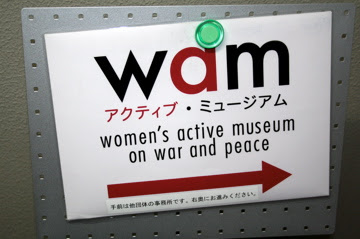 Yay! just got the news this morning. My short film, which I have endlessly plugged on this blog, Peace Begins with Me and You is now part of the International Museum of Womens' July exhibit which ties Religion, Spirituality and Politics together. Have a take a look at my film here. The exhibit provides a platform for conversation to talk about important world issues, so check my film out, check out other films/art and leave comments!
Yay! just got the news this morning. My short film, which I have endlessly plugged on this blog, Peace Begins with Me and You is now part of the International Museum of Womens' July exhibit which ties Religion, Spirituality and Politics together. Have a take a look at my film here. The exhibit provides a platform for conversation to talk about important world issues, so check my film out, check out other films/art and leave comments!
I particularly like my highlighted quote: "Practicing Buddhism and Hinduism, I discovered that meditation and mindfulness are the seeds of inner-peace. Grounded in my spirituality, I started volunteering, holding my elected officials accountable and raising my voice in protest. I have come to believe that women, empowered and supported by their spirituality, can bring about remarkable change."
This is what they wrote about me in their summary of the exhibit:
"Japanese-American peace activist Megumi Nishikura began a spiritual journey that led her to the path of political action. Her short film, Peace Begins with Me and You combines documentary, animation and personal narrative into a message to all women."
Wow, better than I could ever say it!
My Films
Wednesday, July 02, 2008
PBWMY accepted to the International Museum of Women
Tuesday, January 29, 2008
Women's Active Museum on War and Peace
Since my summer in Berlin, I have been wondering about the differences between how the Germans and the Japanese dealt with their war aggressions in the aftermath of WWII. Take a walk around Berlin and it is easy to see the remembrances to the Holocaust- the Jewish museum, the Jewish memorial, names of Jews embossed on to the pavements- but here in Tokyo no such memorials are to be found.
Sure, Japan is all about peace. Earlier in 2007, I traveled to Hiroshima with my classmates to learn about that atomic bomb and meet with hibakusha-radiation victims. (See my film on this trip here.) I've also heard somewhere that Japan has supposedly the largest number of peace museums in the world. Yet, due to the devastation of the atomic bomb, the Japanese state has perpetuated a victim consciousness that still remains strong today. Japan has never properly come to terms with the its responsibility for its past deeds.
However, there is one museum here in Tokyo which is aimed at educating the public of Japan's World War II aggressions against women. Over the weekend, my friends and I visited the Women's Active Museum on War and Peace in Waseda. WAM is dedicated to the issues of comfort women which is one of the most controversial topics when it comes to the Japanese aggression during World War II.
These comfort women were recruited through out the Japanese empire from rural areas to work in "comfort stations." Often under 20 years old, these women would be repeatedly raped throughout the day to "comfort" the Japanese military men. Even after the war was over, these women lived in shame and remained in silent suffering until 1991 when Kim Hak-Soon from Korea spoke out.
Demands for apology and compensation continues even today. Every Wednesday in Seoul, the comfort women victims from South Korean demonstrate in front of the Japanese embassy. While an apology was offered in the 1992 Kono Statement, the Japanese government has refused to claim any legal responsibility. As recently as March of 2007, when US Congress demanded that Japan offer a formal apology to the comfort women, Prime Minister Shinzo Abe stated, '"There is no evidence to back up that there was coercion as defined initially" in the role of "the Japanese military or government" in the recruiting of comfort women. '1
At the museum, you can browse through portraits of the comfort women, read their stories, learn about the fights and tribunals on their behalf, and watch an array of films in their library. Unfortunately the museum itself is only in Japanese, and due to size constraints it seems unlikely that much effort will be made to incorporate information in English. But there are a few videos in English that may be helpful in familiarizing you with the issue.
Source:
1. Norhteast Asian History Foundaiton, The truth of Japanese military "Comfort Women" 2007


